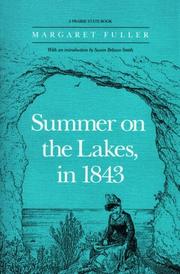Check nearby libraries
Buy this book

xxii, 156 p., [12] p. of plates : 23 cm
Check nearby libraries
Buy this book

Previews available in: English
Subjects
Description and travel, Travel, Fuller, margaret, 1810-1850, Fuller, Margaret, 1810-1850 -- Travel -- Great Lakes Region (North America), Fuller, Margaret, 1810-1850 -- Travel -- Northwest, Old, Great Lakes Region (North America) -- Description and travel, Northwest, Old -- Description and travel, Travelfuller, margaret , 1810-1850, F551 .f86 1991, 917.704/2People
Margaret Fuller (1810-1850)| Edition | Availability |
|---|---|
| 1 |
aaaa
|
| 2 |
bbbb
|
| 3 |
zzzz
|
| 4 |
bbbb
|
Book Details
Edition Notes
Reprint of 1844 ed.
Classifications
The Physical Object
ID Numbers
Source records
Scriblio MARC recordUniversity of Prince Edward Island MARC record
Better World Books record
Library of Congress MARC record
Internet Archive item record
ISBNdb
marc_columbia MARC record
Work Description
Sarah Margaret Fuller Ossoli (1810-1850), better known as Margaret Fuller, was a writer, editor, translator, early feminist thinker, critic, and social reformer who was associated with the Transcendentalist movement in New England. This is her introspective account of a trip to the Great Lakes region in 1843. Organized as a series of travel episodes interspersed with literary and social commentary, the work displays a style common to the portfolios, sketch books, and commonplace books kept by educated nineteenth-century women. In addition to her own thoughts about natural landscapes and human encounters, Fuller includes stories, legends, allegorical dialogues, poems, and excerpts from the works of other authors. When she traveled to the Midwest, Fuller was exhausted by her work as editor of the Dial, the Transcendentalist journal she edited with Ralph Waldo Emerson. Accompanied during part of the journey by her friends James Clarke and Sarah Clarke, who created the book’s etchings, Fuller traveled by train, steamboat, carriage, and on foot in a circle from Niagara Falls north to Mackinac Island and Sault Ste. Marie, west to Milwaukee, south to Pawpaw, Illinois, and back to Buffalo. Fuller discusses Chicago in some detail, and laments the unjust treatment of Native Americans. She comments on the difficulties of pioneer life for women and on the degradation of the region’s beautiful and exhilarating natural environment. She speaks favorably about the British-American agrarian visionary, Morris Birbeck, and includes a short story about an old school friend, Mariana, who dies because her active mind cannot adapt to the restrictive codes of behavior prescribed for the era’s elite women.
– Library of Congress American Memory website
Links outside Open Library
Community Reviews (0)
Feedback?History
- Created April 1, 2008
- 14 revisions
Wikipedia citation
×CloseCopy and paste this code into your Wikipedia page. Need help?
| July 18, 2024 | Edited by MARC Bot | import existing book |
| December 19, 2023 | Edited by ImportBot | import existing book |
| October 24, 2023 | Edited by Scott365Bot | import existing book |
| September 30, 2023 | Edited by Scott365Bot | Linking back to Internet Archive. |
| April 1, 2008 | Created by an anonymous user | Imported from Scriblio MARC record |












